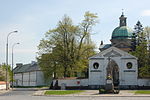Space Research Centre of Polish Academy of Sciences

The Space Research Centre (SRC, Polish: Centrum Badań Kosmicznych) is an interdisciplinary research institute of the Polish Academy of Sciences. It was established in 1977. SRC PAS is the only institute in Poland whose activity is fully dedicated to the research of terrestrial space, the Solar System and the Earth using space technology and satellite techniques. The SRC also acts as Poland's national space agency until the Polish Space Agency) is fully established. Since 1977 the SRC staff developed, constructed and prepared for launch over 60 instruments and participated in the experiments in more than 50 space missions, for example: European Space Agency's Cassini–Huygens mission (investigation of Saturn and Titan), INTEGRAL (space laboratory of high energy astrophysics), Mars Express (Mars orbiter), Rosetta (mission to comet), Venus Express (Venus orbiter), Herschel Space Observatory (investigation of the coldest and most distant objects in the Universe), BepiColombo (mission to Mercury), Roscosmos's Koronas-F, Koronas-I, Koronas-Foton and Fobos-Grunt missions, and CNES' DEMETER and TARANIS missions. Space Research Centre has co-operated with the ESA since 1991. SRC has also collaborated with NASA (IBEX mission) and ISRO (Chandrayaan programme).
Excerpt from the Wikipedia article Space Research Centre of Polish Academy of Sciences (License: CC BY-SA 3.0, Authors, Images).Space Research Centre of Polish Academy of Sciences
Bartycka, Warsaw Mokotów (Warsaw)
Geographical coordinates (GPS) Address Nearby Places Show on map
Geographical coordinates (GPS)
| Latitude | Longitude |
|---|---|
| N 52.2145 ° | E 21.0676 ° |
Address
Centrum Badań Kosmicznych - PAN
Bartycka 18A
00-716 Warsaw, Mokotów (Warsaw)
Masovian Voivodeship, Poland
Open on Google Maps











